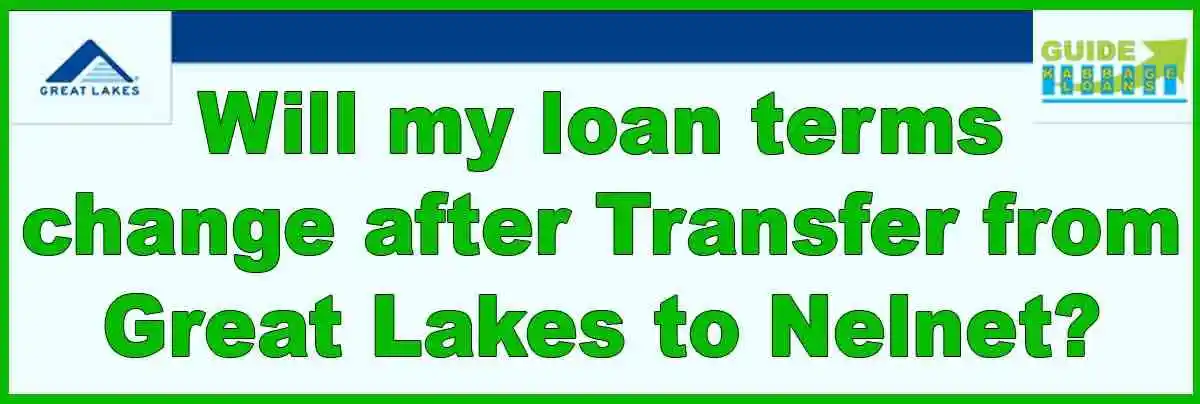Great Lakes is a familiar name when it comes to student loan servicing. The company has been a reliable partner in managing student loan payments and providing support to borrowers. In this guide, we will explore the reasons why Great Lakes moved your loans to Nelnet and the implications for borrowers.
When messages came from Great Lakes to transfer the loan, they contained the information that Great Lakes Moved Your Loans to Nelnet. So, a lot of questions arose in the Borrower’s mind regarding why this happened and what the reason for it was.
Introduction: Brief Overview of Great Lakes and Nelnet.
Great Lakes Higher Education Corp. and Nelnet are two prominent federal student loan servicers in the U.S. Nelnet acquired Great Lakes in 2018, but both companies initially continued managing their portfolios independently. In 2022, a major transition began, with Great Lakes transferring its loan servicing duties to Nelnet.
This process, which started in March and is expected to conclude by mid-2023, impacts millions of borrowers. As a result, those whose loans were managed by Great Lakes are now required to move their accounts and payment arrangements over to Nelnet.
The Great Lakes and Nelnet Merger: Background and Implications.
The merger between Great Lakes Higher Education Corp. and Nelnet began in 2018 when Nelnet acquired Great Lakes, creating a powerful partnership in the federal student loan servicing industry. Despite the acquisition, the two companies initially managed their operations separately.
However, in March 2022, the integration process began, with Great Lakes gradually transferring its loan servicing portfolio to Nelnet, a shift expected to be fully completed by June 2023.
Implications for Borrowers:
This transition means that millions of borrowers who were previously serviced by Great Lakes will now have their loans managed by Nelnet. As a result, borrowers must create new online accounts with Nelnet, reestablish payment preferences, and stay informed about any changes in loan management.
Although Great Lakes will still forward payments for a limited time after the transfer, Nelnet will fully take over all servicing duties, including processing payments, handling deferments, and managing repayment options like income-driven plans.
While this merger aims to streamline loan servicing, borrowers may face challenges such as adjusting to a new platform and dealing with potential errors or disruptions during the transition. However, both companies are working to ensure a smooth handover, and customers are advised to stay proactive in managing their accounts during this period.
Why Great Lakes Moved Your Loans to Nelnet?
The decision to move federal student loans from Great Lakes to Nelnet stems from the broader integration efforts following Nelnet’s acquisition of Great Lakes in 2018. Both companies are federal loan servicers under contracts with the U.S. Department of Education, and consolidating the servicing operations under Nelnet allows for streamlined management and cost efficiency.
Here are the primary reasons for this transfer:
- Streamlining Operations: After Nelnet acquired Great Lakes, both companies operated separately for some time. Moving Great Lakes’ portfolio to Nelnet is part of a plan to consolidate resources and systems, making the loan servicing process more efficient under one umbrella.
- Enhancing Loan Servicing: Nelnet aims to provide a unified platform with improved services and tools for managing federal student loans. By transitioning Great Lakes borrowers to Nelnet’s system, the company hopes to offer a more consistent and user-friendly experience.
- Contract Realignment with the Department of Education: Federal student loan servicing contracts are periodically updated or reassigned. By consolidating operations under Nelnet, the company can better align with the Department of Education’s future goals for loan servicing.
Will my loan terms change after the transfer from Great Lakes to Nelnet?

The transfer from Great Lakes to Nelnet should not result in any changes to the terms of your loan. The U.S. Department of Education authorized the transfer of Great Lakes’ entire portfolio of federal student loans to Nelnet. Your loan was not sold, and the Department of Education will continue to own your loan while Nelnet manages it and serves as your federal student loan servicer.
Can I prevent Great Lakes from transferring my loans to Nelnet?
No, as a borrower, you cannot prevent Great Lakes from transferring your loans to Nelnet. Because it is not your job to transfer this loan. This is the decision of the loan company itself. As you know Great Lakes and Nelnet have merged. That’s why Great Lakes and Nelnet will decide on whose loan to transfer and whose loan not to transfer.
Will my interest rate change after my loans are transferred to Nelnet?
No, Your interest rate will remain unchanged after your loans are transferred to Nelnet. Your loans were not sold; they are still owned by the Department of Education. Nelnet’s role is to manage and service your federal student loans on behalf of ED. This transition will not affect your loan’s existing status, terms, conditions, interest rate, or the range of available repayment plans.
Your loans will continue to adhere to the same terms and conditions as they did before the transfer to Nelnet, providing you with consistency and predictability in managing your federal student loan.
How do I consolidate my student loans with Nelnet?

To consolidate your student loans with Nelnet, you need to apply for a Direct Consolidation Loan through the U.S. Department of Education. Here’s a simple guide:
- Visit StudentAid.gov: Go to the official website, StudentAid.gov, and log in to your account using your FSA ID.
- Start the Application: Look for the “Consolidate My Loans“ option. Fill out the online application form with details about your existing loans.
- Choose Nelnet as Your Servicer: During the application, you will be asked to select a loan servicer. Choose Nelnet to handle your new consolidation loan.
- Select Repayment Plan: You’ll be given options for repayment plans. Choose the one that best fits your financial situation. You can opt for an income-driven repayment plan if you want your payments to be based on your income.
- Submit Your Application: After completing all the steps, submit your application. Nelnet will contact you once the consolidation is approved and set up your new loan.
If you have any questions, you can always contact Nelnet customer service for assistance.
What should I do if I have issues with Nelnet after my loans are transferred from Great Lakes?
If you have any issues with Nelnet, you should contact their customer service department. They can assist you with any questions or concerns you may have about your loans or loan servicing. Because now your loan has come to Nelnet. Whatever your problem may be, only those people can help you.
You have no connection with the Great Lakes. Because your loan is transferred from there to Nelnet. If there is any problem, then you can contact their customer support or fill out the contact form by visiting their official website. Within no time those people will contact you and solve your problem.
The Impact of Loan Transfer on Borrowers: Analyzing the Effects of Loan Transfer on Borrowers.

For borrowers, the transfer of loans from Great Lakes to Nelnet should not have a significant impact on their loans. Your loan terms should remain the same, & you will continue to make payments as usual. Then, it is essential to review your loan details and contact Nelnet if you have any concerns.
Conclusion:
The transfer of loans from Great Lakes to Nelnet was a result of a merger between the two companies. For borrowers, the transfer should not have a significant impact on loans, and loan terms and conditions should remain the same.
However, borrowers should review their loan details and contact Nelnet if they have any concerns or issues. Overall, the merger between Great Lakes and Nelnet should provide borrowers with better resources and support to manage their student loans.
Faq’s:
Will I still have access to my loan information and account history after the transfer to Nelnet?
Yes, you will still have access to your loan information and account history after the transfer to Nelnet. You can log in to your Nelnet account to view your loan details, make payments, and manage your account.
Will Nelnet charge me any fees after the transfer from Great Lakes?
No, Nelnet will not charge you any fees for the transfer of your loans from Great Lakes. There are no fees associated with loan transfers.
What happens if I have a pending payment with Great Lakes during the transfer?
If you have a pending payment with Great Lakes during the transfer, they will process the payment as usual. Once the transfer is complete, future payments should be made to Nelnet.
Will Nelnet offer the same repayment options as Great Lakes?
Yes, Nelnet will offer the same repayment options as Great Lakes. You can continue to choose from the same repayment plans that were available to you with Great Lakes.
Can I refinance my loans with a different lender after the transfer to Nelnet?
Yes, you can refinance your loans with a different lender after the transfer to Nelnet. However, you should carefully consider the terms and conditions of any refinancing offer before accepting it.
Thanks for your visit.
(Why Great Lakes Moved Your Loans to Nelnet?)
Disclaimer: The information provided in this article is for educational purposes only and does not constitute legal advice. The content is based on publicly available information regarding the loan transfer between Great Lakes and Nelnet. Readers are advised to consult their loan servicer or a financial professional for specific advice related to their loans.





